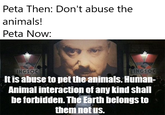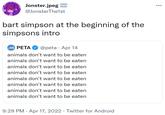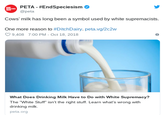People for the Ethical Treatment of Animals (PETA)
This submission is currently being researched & evaluated!
You can help confirm this entry by contributing facts, media, and other evidence of notability and mutation.
About
People for the Ethical Treatment of Animals (PETA), usually stylized PeTA, is an American animal rights organization based in Norfolk, Virginia, and led by the international president Ingrid Newkirk. A non-profit corporation with 300 employees and two million members and supporters across the globe, it claims to be the largest animal rights group in the world. Its slogan is "animals are not ours to eat, wear, experiment on, or use for entertainment."[1]
Online History
Founded in March 1980 by Newkirk and fellow animal rights activist Alex Pacheco, the organization first caught the public's attention in the summer of 1981 during what became known as the Silver "Spring monkeys" case, a widely publicized dispute about experiments conducted on 17 macaque monkeys inside the Institute of Behavioral Research in Silver Spring, Maryland. Spanning over nearly a decade, the case involved the only police raid on an animal laboratory in the United States, triggered an amendment in 1985 to that country's Animal Welfare Act and established PETA as an internationally known organization.[2]
Since then,the group has focused on four core issues--opposition to factory farming, fur farming, animal testing, and animals in entertainment--through its outreach campaigns and undercover investigations. Other interests of PETA include campaigns against fishing, the killing of animals regarded as pests, the keeping of chained backyard dogs, cock fighting, dog fighting, and bullfighting.[3]
Criticism
The group has been the focus of criticism from inside and outside the animal rights movement. Newkirk and Pacheco are seen as the leading exporters of animal rights to the more traditional animal protection groups in the United States, but sections of the movement nevertheless say PETA is not radical enough--law professor Gary Francione calls them the new welfarists, arguing that their work with industries to achieve reform makes them an animal welfare, not an animal rights, group.
Newkirk told Salon in 2001 that PETA works toward the ideal, but tries in the meantime to provide carrot-and-stick incentives. There has also been criticism from feminists within the movement about the use of scantily clad women in PETA's anti-fur campaigns, and criticism in general that the group's media stunts trivialize animal rights. Newkirk's view is that PETA has a duty to be "press sluts".
PETA has also produced various Flash games showcasing their campaigns, including parodies of Cooking Mama,[4] Super Mario Bros.,[5] and Super Meat Boy.[6]
A game released in November 2011 features a skinned tanuki chasing Mario to reclaim its fur from him. This was widely criticized as "absurd and unresearched" by the gaming community, prompting PETA to claim that it was a tongue-in-cheek effort to draw attention to the real-life issue of tanuki being skinned alive.
Other campaigns are less confrontational and more humorous. In 2008, it launched the "Save the Sea Kittens" campaign to change the name of fish to "sea kittens" to give them a positive image, and it regularly asks towns to adopt a new name. It campaigned in 1996 for a new name for Fishkill, New York, and in April 2003 offered free veggie burgers to Hamburg, New York, if it would call itself Veggieburg.
PETA sometimes issues isolated statements or press releases, commenting on current events. After Lady Gaga wore a dress made of meat in 2010, PETA issued a statement objecting to the dress.[58] After a fisherman in Florida was bitten by a shark in 2011, PETA proposed an advertisement showing a shark biting a human, with the caption "Payback Is Hell, Go Vegan". The proposed ad drew criticism from relatives of the injured fisherman.[59]
In August 2011, it was announced that PETA will be launching a soft pornography website in the .xxx domain. PETA spokesperson Lindsay Rajt told the Huffington Post, “We try to use absolutely every outlet to stick up for animals,” adding that “We are careful about what we do and wouldn’t use nudity or some of our flashier tactics if we didn't know they worked.”
PETA also used nudity in its "Veggie Love" ad which it prepared for the Super Bowl only to have it banned by the network. PETA's work has drawn the ire of some feminists who argue that the organization sacrifices women's rights to press its agenda. Lindsay Beyerstein criticized PETA saying “They're the ones drawing disturbing analogies between pornography, misogyny and animal cruelty."[50]






![PETA trying so hard. PETA O. PETA @peta 4/14/22 animals don't want to be eaten animals don't want to be eaten animals don't want to be eaten animals don't want to be eaten animals don't want to be eaten animals don't want to be eaten animals don't want to be eaten animals don't want to be eaten 10.9K 9,388 3,590 la Tim Young Animals are delicious. Animals are delicious. Animals are delicious. Animals are delicious. Animals are delicious. Animals are delicious. Animals are delicious. Animals are delicious. Animals are delicious. Animals are delicious. Animals are delicious. Animals are delicious. 1,048 191 @TimRunsHisM.... 4/17/22 22.9K la : ↑ ←] 企](https://i.kym-cdn.com/photos/images/list/002/608/858/011)









Top Comments
D4rkdemon
Jan 03, 2013 at 07:08PM EST
Tupolev Tu-22M Backfire
Jun 01, 2014 at 04:29AM EDT